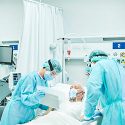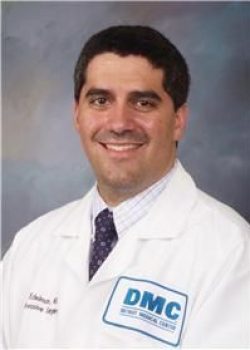Minimally Invasive Surgery
Fellowship
About the Minimally Invasive Surgery Fellowship
This is an all-inclusive fellowship that includes general, robotic, MIS, bariatric, and trauma.
The fellowship has been accredited by the Fellowship Council in both advanced minimally invasive surgery and minimally invasive bariatric surgery. The fellowship is in its fifth year of existence and has graduated four fellows. An eighth fellow is currently in training and has an anticipated graduation date of June 30, 2016. The mix of cases in the fellowship is quite varied but is equally split between advanced minimally invasive non-bariatric surgery (hernias, colons, Nissens, etc.) and minimally invasive bariatric surgery.
The fellow will achieve the required number of cases for the advanced minimally invasive non-bariatric portion of the fellowship (150 MIS cases) and also achieve the required number of cases for the minimally invasive bariatric surgery portion of the fellowship (50 gastric bypasses, 10 restrictive – Lap-Bands and sleeves), and 5 revisions for a total of 100 cases). The minimum number of cases the fellow will complete is 250.
The fellow must be available for call but is rarely called in. The fellow will share weekend rounding responsibilities with the senior resident on the service, i.e., round on the service every other weekend. Call is out of the hospital and is minimal. No trauma. Half day per week of clinic responsibilities. Attend one national conference during the year of the fellowship with fees covered, guaranteed salary and some clinical research.
The average fellow will graduate with approximately 400 cases and near 500 procedures. This is a very hands-on minimally invasive fellowship. The fellow will be expected to start scrubbing from day one and there is no acclimation time, that is, no “holding the camera” for a month or two. The fellow will learn how to set up a bariatric practice. The half day in clinic is dedicated to seeing a variety of patients and diseases, but the fellow will learn how to perform Lap-Band fills and manage these fills with some autonomy. The fellow will also follow-up on post gastric bypass and sleeve patients. At the end of the year, the fellow will be able to manage bariatric patients through all stages of surgery, i.e., pre-operative, peri-operative and post-operative.
The fellowship is clearly geared toward minimally invasive surgery in general. There are very few “open procedures” performed by the fellow, since the senior resident on the service will do most of these cases. Although there is a strong bariatric component (approximately 200 cases), there is also a very strong advanced minimally invasive component, i.e., laparoscopic colectomies (approximately 40 cases/year), laparoscopic fundoplication (approximately 15 cases), laparoscopic inguinal hernia repairs (approximately 40 cases) and laparoscopic ventral hernia repairs (approximately 60 cases).
Duration of fellowship: one year, from August 1 – July 31
Vacation: three weeks
Prospective Fellows
Curriculum
Fellows will be expected to perform preoperative assessment of patients and demonstrate an understanding of the management options, indications, contraindications, and complications associated with the recommended procedure.
Fellows should demonstrate understanding of and ability to order, integrate and interpret perioperative testing and evaluation of all organ systems as related to advanced GI surgery.
Fellows will demonstrate intraoperative decision-making that minimizes complications and demonstrates an awareness of the limitations of his/her technical skills.
Fellows will demonstrate knowledge of anatomy of the GI tract and the abdominal cavity, including as viewed through MIS access, both normal and abnormal.
Fellows will demonstrate knowledge of a variety of approaches (both operative and non-operative) to a given GI tract disease and exhibit reasoning to arrive at the correct procedure for a given patient.
Fellows will demonstrate expertise in interpreting anatomic and physiologic studies of the GI tract and abdominal cavity relevant to their areas of expertise.
Fellows will demonstrate fundamental MIS competency relevant to their area of expertise.
Fellows will acquire skill in diagnostic flexible endoscopy relevant to their area of expertise.
There is a dry lab and our hospital is a FACS, SAGES site for FLS.
Fellows will demonstrate fundamental MIS competency relevant to their area of expertise. These would include some or all of the following:
Basic Skills:
- exposure
- retraction
- tissue handling
- camera navigation
- two-handed manipulation
- port-site placement
- alternative access techniques
- use of angled scopes
- FLS completion (if not completed during residency)
- vascular control and algorithm for
- control of bleeding
- knot-tying ability, both hands, intracorporeal and extracorporeal
- decision to convert a laparoscopic procedure to an open operation
Fellows will demonstrate fundamental MIS competency relevant to their area of expertise. These would include some or all of the following:
Advanced Skills:
- suturing
- stapling
- intracorporeal anastomosis
- adhesiolysis
- running of bowel
- demonstrates knowledge of energy sources
- placement and fixation of prosthetic material
Fellows will be expected to demonstrate understanding of the anatomy, physiology and pathologic conditions of the entire GI tract, abdominal cavity, abdominal wall, and solid organs in the abdominal cavity and retroperitoneum.
Fellows will demonstrate an understanding of the surgical and nonsurgical options for managing pathologic conditions of the entire GI tract, abdominal cavity, abdominal wall, and solid organs in the abdominal cavity and retroperitoneum.
Fellows are expected to be able to appropriately order, read, and interpret diagnostic tests and images.
Fellows are expected to have basic FLS certification (now a requirement for graduating chief residents); to have knowledge of two or more journals delving into Advanced GI Tract Surgery and MIS
Advanced MIS cases (non-bariatric) = 150
- Colon = 40
- Nissen = 15
- Inguinal hernia = 40
- Ventral Hernia = 60
Bariatric cases = 100
- Laparoscopic Roux-en-Y gastric bypass = 50
- Lap-Band = 40
- Laparoscopic sleeve gastrectomy = 10
Our Current Fellows
Our Past Fellows

Goal of Fellowship
To provide fellows with an immersion in the study and practice of diseases of the GI tract and abdominal cavity such that knowledge and skill-based confidence will achieve expert status by the end of the experience.
This Curriculum for Advanced GI Surgery Fellowships describes the goals and objectives of the core competencies that are common to and required by all Fellowships in Advanced GI Surgery including: patient care, medical knowledge, practice-based learning and improvement, interpersonal and communication skills, professionalism and systems-based practice.










